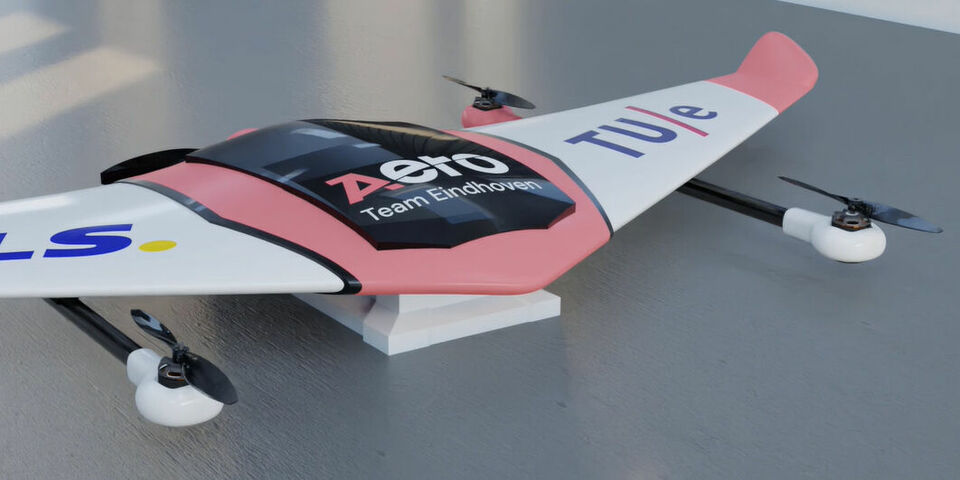Blue Jay and Syfly merge into Aero Team Eindhoven
Air transport without fossil fuels still has one major disadvantage: electric aircrafts can’t travel far. Carrying goods with drones is one way to bypass this problem, when you use a network in which drones fly from depot to depot to change batteries. Student teams Blue Jay and Syfly have joined forces and will develop this innovation under their new name: Aero Team Eindhoven. They will present their merger and their vision to partners and students in the Blauwe Zaal today.
“Every TU/e student who wants to work on drones should keep an eye on Aero Team Eindhoven. We have ambitious plans,” Marthe Post says. She recently obtained her Psychology & Technology bachelor’s degree and became a board member at Blue Jay before she started with her master’s program. She performs HR duties for Aero (Greek for air). Aero’s blue and salmon pink logo is made up of straight lines that represent movement and speed.
Serving beer and picking cherries
Let’s take a few steps back in the origin story. Student team Blue Jay grew out of an idea form a couple of students who wanted to stand out during a TU/e lustrum. During a three-day festival in 2015 to celebrate the university’s sixtieth birthday, their drone managed to serve the guests a glass of draft beer with the effortlessness of an actual waiter. After that, the team accomplished several other goals. Their drones were able to deliver medicines in a hospital, detect a drowning person in a swimming pool, monitor a crowd of people in the PSV stadium and support evacuations in nursing homes. Even though they never made it to the market, these projects were major milestones for the teams that worked on them.
Student team Syfly originated from a TU/e Honors project in 2018 and continued as innovation Space team, after which it was designated as Impact Maker in the new structure for student teams. The team developed a so-called fixed wing drone that predicted the weather and went on to design a quadcopter for picking cherries in an orchard. These prototypes were never developed commercially either.
Continue together
“Both teams are ready to take the next step, and we believe that we will be successful if we join forces and draft a long-term vision,” Matthijs van de Vosse says. He is a master’s student of Control Systems Technology and team manager at Aero, which consists of 35 students.
He expresses the team’s vision as follows: “We develop an innovative way to transport goods by air. In the current situation, electric aircrafts have a range of less than 200 kilometers and a duration of one hour maximum. There are companies that try to improve this kind of sustainable transport by optimizing the batteries, but our approach is fundamentally different. Aero will create a network in which drones fly short distances from depot to depot and autonomously exchange batteries from empty to fully charged in midair. That’s called in air battery swap.”
High priority
Aero is thinking about goods of up to ten kilos that need to be transported over great distances with a high sense of urgency. “Such as pacemakers or medicines, but it also depends on market demand and our partners,” Post says. The team’s current sponsors are parcel service GLS and chip manufacturer NXP. Post and Van de Vosse can already imagine the rooftops of the GLS storage locations serving as hubs in the network of the Aero drones.
“We won’t immediately achieve our objectives,” the team manger says. “Entering the air space is a difficult part. We are dependent on regulations. Other companies are waiting for this too. That’s why our first goal is to prove that our idea can be carried out on the ground. And for that, we first need to get the autonomous battery swap to work. We won’t start flying with our drone until we reach the final phase of our four-year plan.” Aero Team Eindhoven doesn’t know at this point how large or heavy the drones can become, but they do know that it will need to be a fixed wing drone.
Aero hopes to create more continuity with its long-range plan. “One major advantage is that the acquired knowledge won’t get thrown out and passed on to an entirely new team,” the team manager says. Post adds that the current board will definitely continue to be in close contact with Aero next year to help the new board find its way. “We are still looking for successors.”






Discussion